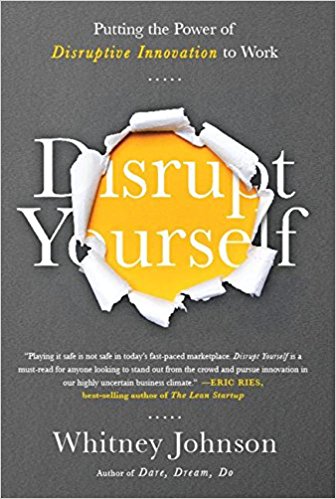Disrupt Yourself Summary
6 min read ⌚
 Putting the Power of Disruptive Innovation to Work
Putting the Power of Disruptive Innovation to Work
Disrupting the market is a concept you fully understand? How about the concept of disrupting your own personal development?
Whitney Johnson’s idea is of the most original – dare we say disruptive? – you’ll ever hear. So, it must be good.
We go over it in our “Disrupt Yourself” summary.
Who Should Read “Disrupt Yourself”? And Why?
The idea of disruptive innovation, strictly speaking, originated in the field of economics, after which it was further developed in the area of business management. Whitney Johnson goes a step further: she takes the idea, reshapes it, and applies it to personal development.
So, basically, “Disrupt Yourself” is written for three types of audiences. The first group are the entrepreneurs who want to disrupt business cycles. The second – are the start-up CEOs who want to learn how to manage their companies better – so they can succeed in the market.
Finally, the third – and most important group – are the people who want to learn how to redefine themselves so they can find their ideal jobs. And be successful!
About Whitney Johnson
Whitney Johnson is an expert in the field of personal disruption and a former Wall Street equity analyst. She is the cofounder of the Disruptive Innovation Fund with Clayton Christensen from Harvard Business School, the guy who introduced to the world the concept of disruptive innovation.
is an expert in the field of personal disruption and a former Wall Street equity analyst. She is the cofounder of the Disruptive Innovation Fund with Clayton Christensen from Harvard Business School, the guy who introduced to the world the concept of disruptive innovation.
In addition to “Disrupt Yourself” Johnson has written two more books: “Dare, Dream, Do” and “Build an A Team.”
“Disrupt Yourself Summary”
Disrupt yourself?
But, isn’t that something pretty negative? Shouldn’t my goal be quite the opposite?
Well, not according to Whitney Johnson! She says that consistency and stability are things of the past! Yes – even when you take personal development into consideration. Or, to put matters into perspective, that their definitions have fundamentally changed.
But, not to go ahead of ourselves!
Now, you know that you can disrupt the market. Just create something new – out of the blue – and put an end to the preceding business cycle, ushering humanity into a new era. After all, that’s what entrepreneurs do every day.
And that’s what Joseph Schumpeter understood to be the driving force behind capitalism sometime before the Second World War. Half a century later, an American scholar by the name of Clayton M. Christensen, further developed this idea to introduce us to the concept of disruptive innovation.
Simply put, it means that once Ford Model T appeared in 1908, companies producing horse-drawn vehicles were suddenly a thing of the past. Yes – even the largest ones!
Consider “Nokia” for a more recent example. They virtually controlled the mobile market not so long ago; but they didn’t hop on the Android bandwagon. And Windows Phone is… well, a “was” now.
However, what Nokia did with Windows Phone could always have ended up that way. After all, it was a shot in the dark. Or, more precisely, a market risk. As opposed to a competitive risk – which means competing against the others in the same category – a market risk means competing in a league of your own.
In other words, a competitive risk is founding a company for horse-drawn vehicles at the beginning of the last century, because you think you can make them better or offer them at lower prices. Market risk is founding an automobile company, because you think this new vehicle is better.
Obviously, a market risk is riskier than a competitive one. But, according to the analyses of Clayton Christensen, it’s also far more rewarding.
But, how does this long economical digression relate to you – or the title of Whitney Johnson’s book for that matter? Well, it should very much so – because it suggests that you should be an automobile in a world of carriages!
In other words, find your unique strengths and turn yourself into a never-before-seen product!
We know that it sounds too cliché and cheesy to be true! But, believe us – it is!
As we have told you before, the word “career” is wrongly defined. A career – much like business strategies – shouldn’t be about going forward, it should be about going left and right. The driving force of success, says Johnson, is curiosity, and the trait you should be aiming for is flexibility.
Moreover, you should always heed to your inner voice. Because, people are usually like-minded not because they don’t think differently, but because it’s easier to be accepted that way.
However, most of the great people in history weren’t accepted by their surroundings. That is, until they devised something that suddenly made them the center of attention.
Just take Jack Dorsey from “Twitter” as an example – he was not exactly a guy who would sit around and not speak his mind.
Even better, consider how much Abdul Lateef Jandali was accepted for most of his early life.
Yes – that’s Steve Jobs.
Key Lessons from “Disrupt Yourself”
1. Disruptive Innovation Makes the Big Fail – and the Small Big
2. Find Your Unique Strengths – and Pair Them with an Unmet Market Need!
3. What Matters Is Hard Work – and Failure Is a Part of It
Disruptive Innovation Makes the Big Fail – and the Small Big
Disruptive innovation is a phrase introduced about two decades ago by Whitney Johnson’s business partner Clayton Christensen.
The idea – described as “the most influential… of recent years” – is that small startups can shake up the market when they pioneer a product big companies don’t have. Once the product is established, even conglomerates take a plunge, and small startups become big companies.
Just think what the introduction of the inexpensive Ford Model T did to carriage companies? Are there any around today?
Find Your Unique Strengths – and Pair Them with an Unmet Market Need!
“Disrupt Yourself” transfers the idea of disruptive innovation from macro- to micro-level. That is, it suggests that you should practice its power yourself!
How?
You can find an example in the movie “The Hundred-Foot Journey.” Hassan, the main character, is great with Indian cuisine, but the place where he lives is suspicious of it. When he is taken under the wing of a French chef, suddenly Hassan has a unique advantage: unlike almost nobody else, he can combine French flavors and Indian spices!
So, he does – and his restaurant is a big success!
Distinctiveness is important – so much so that we guarantee you that you can find un unmet market need the moment you find your uniqueness!
Don’t believe us?
Time to read the story of the chicken whisperer.
What Matters Is Hard Work – and Failure Is a Part of It
Unfortunately, they didn’t teach us well as children.
Namely, it’s not about succeeding, but about putting the effort. Not about the As, but about the hard work you put into getting them. The first mindset results in a whole bunch of cheating techniques; the second – in a curious mind which considers failure a stepping stone to success.
Want a lifechanging lesson?
Teach your children that, as long as they work hard, it’s okay to fail.
Like this summary? We’d like to invite you to download our free 12 min app, for more amazing summaries and audiobooks.
“Disrupt Yourself” Quotes
When you make the decision to start something new, first figure out the jobs you want to do. Then position yourself to play where no one else is playing. Share on X When you disrupt yourself, you are looking for growth, so if you want to muscle up a curve, you have to push and pull against objects and barriers that would constrain and constrict you. That is how you get stronger. Share on X Disrupting yourself is critical to avoiding stagnation, being overtaken by low-end entrants (i.e., younger, smarter, faster workers), and fast-tracking your personal and career growth. Share on X The more closed your network, the more you hear the same ideas over and again, reaffirming what you already believe, while the more open your network, the more exposed you are to new ideas. Share on X When I fail, I am mortified, but I am also heartbroken. I have envisioned a future in which I would achieve a goal, and perhaps be hailed as the conquering hero. And then I didn't. And I wasn't. I've learned it is important to grieve. Share on XOur Critical Review
As Eric Ries says, playing it safe is not safe anymore. Fortunately, Whitney Johnson has written a book about the opposite.
“Disrupt Yourself reads like a handbook for innovation: it shows the incredible value of recognizing what you are good at and finding unexpected ways to apply those strengths to the marketplace. The dramatic ‘jumps’ that Johnson encourages us to take truly form the basis of creativity and success.”
So says Steve Wozniak – and he’s not someone you take lightly. We humbly share his opinion.
Emir is the Head of Marketing at 12min. In his spare time, he loves to meditate and play soccer.


 Putting the Power of Disruptive Innovation to Work
Putting the Power of Disruptive Innovation to Work 




